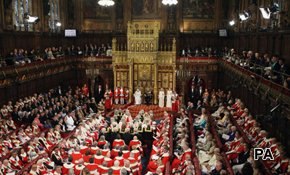With Lords reform debates ongoing, we asked for your views on the matter. Do you think the traditional system is out of touch, or does it get the job done?
There are currently 786 members in the House of Lords. 671 of these are life peers, 90 are hereditary peers, and 26 are senior bishops from the Church of England, or ‘Lords Spiritual’. 600 of these are appointed.
There has been plenty of debate in and around Westminster with regards to altering the structure of the House of Lords – on whether to update it and make it more representative, or to retain its current workings. The push for reform is seen as a Liberal Democrat policy, yet politicians from all parties have spoken up on the issue.
Last month, YouGov's nationally-representative public opinion poll found that 33% of the UK public favour a fully-elected chamber, while 41% would like to see a partially-elected chamber. Just 5% of the British public want a fully-appointed chamber.
We invited you to tell us which side of the House of Lords reform debate you stand. Should the House of Lords be entirely or partially-elected? Or should it remain as it is?
Most participants who responded thought that the Lords needed some kind of reform.
Of these, most would opt for a fully-elected House of Lords, as opposed to a partially-elected one – but either way, most favoured dramatically increasing the public's say in who sits in the second chamber.
All-in-all, these participants believed that the current system was undemocratic, their logic being that anyone involved in the legislative process of governance should have some kind of accountability and legitimacy through elections.
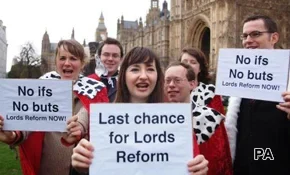
Furthermore, they wanted representation in the second chamber – some of the remarks we received suggested that many felt current peers to be out of touch with modern life and in need of an update.
The main difference between participants who thought the house should be fully or partially elected rested on the role of specialist members with experience in certain fields – who might not be included in a fully elected house.
In comparison, those participants who argued the House of Lords should remain as it is pointed out that the current system is beneficial, in that it isn't necessarily involved with party politics – meaning that laws can be scrutinised impartially, and without the drama of the Commons – and for the wealth of experience held by specialised, appointed members.

What are your views on reforming the House of Lords? Do you think it’s necessary? Or should it be fully or partially elected?
Join the debate below

Here's what our poll participants had to say...
1. The House of Lords should be elected!
Most participants who answered favoured a fully-elected or partially-elected house, where the public would have a hand in voting candidates in – and the underlying arguments put forward by these participants largely followed similar lines of thought.
- Both sets of participants shared the same underlying principles – that there should be a greater push for representative democracy in the House; that electing peers would be a more accountable, legitimate and fairer way of running the second chamber; and to replace an outdated model
- The main point of difference was over the presence of specialist members (those with a wealth of experience in various sectors, such as Lord Alan Sugar)
- Participants who chose a partially-elected House thought that the loss of these members would be a shame
Read the range of opinion from those 'for' electing the Lords here:
Argument 1: For greater democratic representation
“These people shape our lives and our futures - we should have a say in who they are. They should have to fight their case” Chris H, Oxford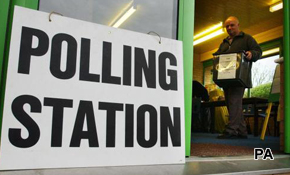
“How can true democracy exist when the majority of people who work for a living are represented by individuals who have never known the strife and turmoil of real life?” Andrew, Swansea
“No one should have the right to have influence over the country simply because they were born a peer. Both houses of parliament are there to represent the people so the people should choose who does this job” Anon, Leeds
“The entire legislative process should be carried out by elected representatives – anything else is undemocratic” Geraint, Islay
“Partially electing the House of Lords would allow us to have the best of both worlds – the Lords would be a democratic institution, and it would retain all the advantages of having specialist grounds and interests represented” Anon
“There are too many of the 'same' kinds of people getting in, fresh voices that reflect the views of the nation should be in the House of Lords” Anon
“The House of Lords is a club for unelected politicians and has no connection with real life. The church has no right to represent the public” Peter S, Sidcup
“It should represent the population and be independent of political parties. It could represent sectors of society, business, professions, sports etc.” DJ, Dorset
Argument 2: It would be more accountable, legitimate and fair
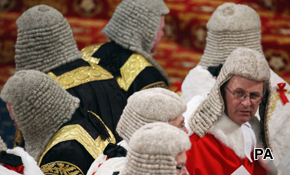 “To give accountability to the system. The lords there by birth may be there and doing a good job but we don't know. It would take all the scandal out of peerages” Rob
“To give accountability to the system. The lords there by birth may be there and doing a good job but we don't know. It would take all the scandal out of peerages” Rob
“Peers need to be accountable to the electorate. How can Britain preach about democracy when we are not democratised ourselves?” Alan, Buckinghamshire
“If it is majority elected, it would then be able to have more legitimate say in passing bills and that the Commons would need to take notice of this and not throw out amendments etc.” Anon
“A second chamber is a valuable part of an effective democracy, but there is no legitimacy to the House of Lords. It needs some democratic legitimacy to be a valuable part of the system” Gwen, Cardiff
“No one in today's society should be privileged to such an extent or that they are allowed to make decisions that affect others, without people knowing who or what they do or what they stand for” Anon
“There is currently no accountability, they say the House of Lords does a good job, but who decides this?” Rick, Buxton
“Anyone who wields power, anyone who can affect the laws that we all have to obey, must be approved by those that they govern for their power to be of any legitimacy at all” Ed, Northampton
"The system of "appointees" is obviously open to party political corruption and favouritism" Anthony B, Kent
Argument 3: The current system is old-fashioned
“The time for Hereditary and 'Honour' Peers has gone, as a democratic nation we should be able to vote for a second House (Like the American Senate)” Davie 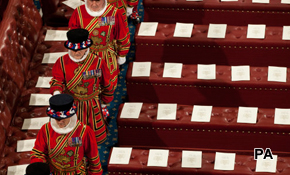 J, Hampshire
J, Hampshire
“Unelected legislators are a ludicrous anachronism in principle: the Lords must either be simply abolished (unicameral legislatures aren't so bad) or rendered democratic” James, Perth
“System would be more fair, and more in touch with life today” Anon
“Outdated system of hereditary peers. Modern society should move on and elect its government” Anon
“It is currently an undemocratic hangover from days of old, used as part of patronage to reward ‘service’ elsewhere” Mark O, Stafford
“It is ridiculous in this day and age to have people effectively ruling by privilege, especially 'hereditary peers' – this is almost feudalism. I also object to the 'Lords Spiritual' members – this represents a huge overrepresentation of the Church of England” Rory O, Manchester
“Quite often it is places for ‘the boys’ - after a general election too many ex-politicians become lord/baroness” Anon
“No other country in the world has an unelected law-making body; it is backward and does not help bring confidence in our government” Beka, London
2. The House of Lords should remain as it is!
There were some who took part who said the House of Lords should retain its current format. But why?
- An elected lords would be 'too political', came one argument, and the virtue of the Lords was in its impartiality, compared to the cut-and-thrust of party-political Commons debate.
- Following on from this, participants opposed to changing the Lords said that doing so would dilute its authority as a check on Commons' activity.
Read the range of opinion from those 'against' electing the Lords here:
Argument 1: Elected Lords would be ‘too political’
“It would be more likely that there would be cabinet ministers and Prime Ministers chosen out of the elected Lords. It would also be full of career politicians” Mark, London
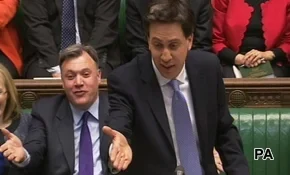
“It should be independent of Parliament. If elected it would become more political and influenced by the politics of Parliament” Neil M, Huddersfield
“The House of Lords has always been a safety net and where necessary a brake for the Government. I worry that if it was to become entirely elected then the members would be subject to the pressures of public whims” Heide, Wales
“The current people in the House don't have to worry about popularity so they can make decisions that are right but would be unpopular. They also provide stability and continuity” Anon
“Electing the second chamber may mean that members will vote for the short term ... rather than what is best for the country” Anon
“The role of the House of Lords is to advise and help to shape legislation through reasoned and informed debate. As an institution that is largely free of the influence of the major political parties, it is able to be more impartial than the House of Commons, and to act as a more effective check of the Executive branch of the Government” Anon
“The crossbencher presence in the House of Lords means that they can look at policy impartially and consider the pros and cons of each proposal. Party whips would just take over the votes if the House of Lords were to be elected” Aidan F, Iver
Argument 2: Reform would remove the current benefits of the system
“At least at the moment we have some people there who are in it for the long term - elections would change this” Anon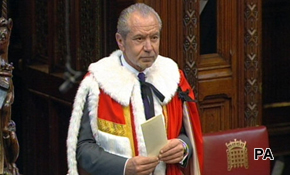
“The current system provides some protection to the population which would not exist in an elective dictatorship. It has served the UK well for centuries and I do not trust elected politicians” Anon
“There is much expertise there now which would, presumably, be dispensed with if a new start was made” Anon
“It will damage the principle of the primacy of the Commons, as well as ensuring that we lose the benefit of various topic experts in the Lords in favour of just another group of career politicians” Anon
“I believe that the vast majority of specialists would not stand for election, since they have other jobs too. Therefore, the Lords would lose this pivotal feature” Anon
“The Lords do an excellent job at improving the often rushed and poor quality legislation that originates in the House of Commons.” Anon
“The quality of the house would deteriorate if partially or wholly elected. The standard of debate is far superior to the commons and would simply descend to same level of yah-boo confrontation” Pete G, Sheffield

What are your views on reforming the House of Lords?
Join the debate below

Follow and discuss: @YouGovLabs on Twitter
